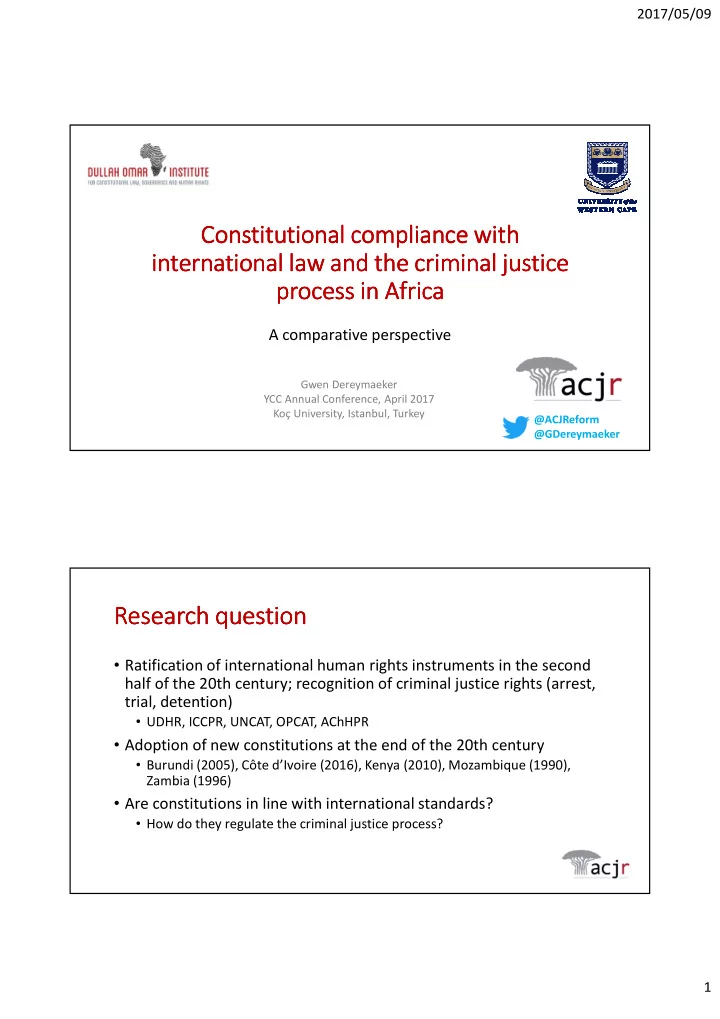

2017/05/09 Constitutional compliance with Constitutional compliance with Constitutional compliance with Constitutional compliance with international law and the criminal justice international law and the criminal justice international law and the criminal justice international law and the criminal justice process in Africa process in Africa process in Africa process in Africa A comparative perspective Gwen Dereymaeker YCC Annual Conference, April 2017 Koç University, Istanbul, Turkey @ACJReform @GDereymaeker Research question Research question Research question Research question • Ratification of international human rights instruments in the second half of the 20th century; recognition of criminal justice rights (arrest, trial, detention) • UDHR, ICCPR, UNCAT, OPCAT, AChHPR • Adoption of new constitutions at the end of the 20th century • Burundi (2005), Côte d’Ivoire (2016), Kenya (2010), Mozambique (1990), Zambia (1996) • Are constitutions in line with international standards? • How do they regulate the criminal justice process? 1
2017/05/09 Constitutional framework Constitutional framework Constitutional framework Constitutional framework • Constitutional right may be directly (length of police custody) or indirectly (right to human dignity) enshrined • Interpretation clauses • Limitation clauses • Internal qualifiers Monism vs dualism Monism vs dualism Monism vs dualism Monism vs dualism • Different status of international law following ratification of an international treaty • Monist countries: Burundi, Côte d’Ivoire, Kenya, Mozambique • Dualist country: Zambia • Supremacy of the constitution • Are monist countries incorporating less rights in their domestic framework? 2
2017/05/09 Approaches to criminal justice Approaches to criminal justice Approaches to criminal justice Approaches to criminal justice • Inquisitorial approach (civil law countries) vs accusatorial approach (common law countries) • Are rights better upheld in constitutions from common law countries? • What impact has international human rights law had on domestic criminal justice rights in countries of either tradition? Difference has faded? Arrest Arrest Arrest Arrest Right Intl law BUR CdI KEN MOZ ZAM Prohibition of arbitrary or unlawful arrest Prohibition of abuse of force while effecting arrest Right to remain silent and privilege against self- incrimination Right to be informed of reasons for arrest 3
2017/05/09 Police custody Police custody Police custody Police custody Right Intl law BUR CdI KEN MOZ ZAM Prohibition of arbitrary or unlawful detention Right to be informed of reasons for police detention Right to be promptly brought before a judge (habeas corpus) Right to safe police custody Right to communicate with a lawyer Right to remain silent, presumption of innocence and privilege against self- incrimination Trends on arrest and police custody Trends on arrest and police custody Trends on arrest and police custody Trends on arrest and police custody • Prohibition of arbitrary/unlawful arrest and detention and the prohibition of torture and other ill-treatment almost systematically recognised; • Weak informational rights; • Weak protection during police interrogation; • The short duration of arrest and police custody should not excuse the weak protection of arrestees and of those in police custody. 4
2017/05/09 Fair trial rights Fair trial rights Fair trial rights Fair trial rights Right Intl law BUR CdI KEN MOZ ZAM General reference to the right to a fair trial Principle of legality Right to the presumption of innocence Right to be informed of the charge Protection against double jeopardy Right to a speedy trial Fair trial rights (cont’d) Fair trial rights (cont’d) Fair trial rights (cont’d) Fair trial rights (cont’d) Right Intl law BUR CdI KEN MOZ ZAM Right not to be detained on remand Right to legal representation Right to be tried and sentenced in an open court Right not to be tried in absentia Right to an interpreter 5
2017/05/09 Evidence during trial Evidence during trial Evidence during trial Evidence during trial Right Intl law BUR CdI KEN MOZ ZAM Right to present and challenge evidence Right to have evidence obtained under torture excluded Right to remain silent and privilege against self- incrimination Sentencing Sentencing Sentencing Sentencing Right Intl law BUR CdI KEN MOZ ZAM Prohibition of the death penalty Right to review or appeal one’s sentence 6
2017/05/09 Trends in relation to trial Trends in relation to trial Trends in relation to trial Trends in relation to trial • Much wider basis for rights in international law; • Right generally better upheld in common law countries; • Several universally upheld rights: fair trial, principle of legality, presumption of innocence, right to legal representation; • Informational rights remain weak. Detention Detention Detention Detention Right Intl law BUR CdI KEN MOZ ZAM Prohibition of arbitrary or unlawful detention Informational rights Right to safe custody Right to be separated 7
2017/05/09 Trends in relation to prison detention Trends in relation to prison detention Trends in relation to prison detention Trends in relation to prison detention • Overall, weak international and constitutional protection. • Even legislation remains problematic in many countries: solitary confinement, hard labour, corporal punishment, no rehabilitation programmes, weak oversight, issues around release at the end of a sentence. Overall trends Overall trends Overall trends Overall trends ALL KEN INTL LAW ZAM COUNTRY MOZ CdI BUR RIGHTS (2010) (1996) AV. (1990) (2016) (2005) Arrest 4 3,5 3 2 2,5 2 3 2 Police custody 6 5,5 3 4 3,6 4 3 1,5 Trial 16 15 15,5 11,5 9,6 8,5 6 7 Detention 4 3 2,5 2,5 2,4 2 3 1,5 30 27 24 20 18,1 16,5 15 12 Total 8
2017/05/09 Overall trends (cont’d) Overall trends (cont’d) Overall trends (cont’d) Overall trends (cont’d) • Neither the monist or dualist nature of a legal system could explain its incorporation of international criminal justice rights in its constitution; • To a certain extent, the inquisitorial or accusatorial approach to criminal procedure could explain a country’s incorporation of criminal justice rights in its constitution; • On average, common law countries uphold more rights • Kenya supersedes international law • Generally, weak rights before first court appearance and weak informational rights; • Generally, very little judicial activism to uphold these rights, especially in civil law countries. Thank you Thank you Thank you Thank you 9
Recommend
More recommend